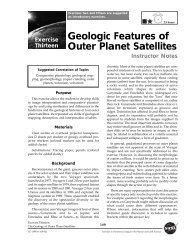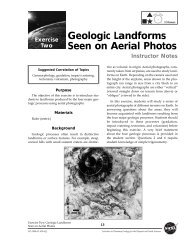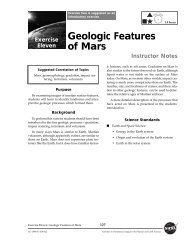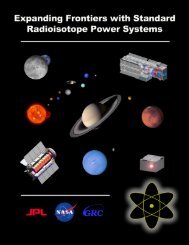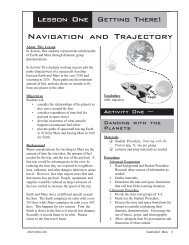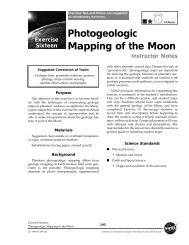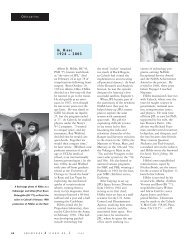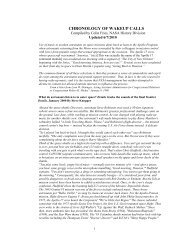Vision and Voyages for Planetary Science in the - Solar System ...
Vision and Voyages for Planetary Science in the - Solar System ...
Vision and Voyages for Planetary Science in the - Solar System ...
Create successful ePaper yourself
Turn your PDF publications into a flip-book with our unique Google optimized e-Paper software.
up observations. Likewise, monitor<strong>in</strong>g of Uranus <strong>and</strong> Neptune <strong>for</strong> anomalous cloud activity is solidly<br />
with<strong>in</strong> <strong>the</strong> capabilities of amateurs. Amateurs play an <strong>in</strong>creas<strong>in</strong>g role <strong>in</strong> <strong>the</strong> study of asteroids, both<br />
through photometric monitor<strong>in</strong>g <strong>and</strong> occultations, as well as observ<strong>in</strong>g fast-mov<strong>in</strong>g near-Earth objects<br />
<strong>for</strong> orbit determ<strong>in</strong>ations. NSF support <strong>for</strong> modest <strong>in</strong>vestments <strong>in</strong> small observ<strong>in</strong>g facilities, such as<br />
equipment or filter sets <strong>for</strong> modest telescopes operated on university campuses or by amateur<br />
astronomers, would enhance <strong>the</strong> current synergy with professionals.<br />
Laboratory Studies <strong>and</strong> Facilities <strong>for</strong> <strong>Planetary</strong> <strong>Science</strong><br />
In order to maximize <strong>the</strong> scientific return from NSF-funded ground-based observations <strong>and</strong><br />
NASA space missions alike, materials <strong>and</strong> processes must be studied <strong>in</strong> <strong>the</strong> laboratory. <strong>Planetary</strong><br />
science <strong>in</strong>tersects with many areas of astrophysics that receive NSF fund<strong>in</strong>g <strong>for</strong> laboratory<br />
<strong>in</strong>vestigations. Although laboratory research costs a fraction of missions, <strong>in</strong> most areas it receives<br />
<strong>in</strong>sufficient support, with <strong>the</strong> result that exist<strong>in</strong>g <strong>in</strong>frastructure is often not state of <strong>the</strong> art <strong>and</strong> required<br />
upgrades cannot be made. NSF can make a huge impact on planetary science by support<strong>in</strong>g this vital<br />
area of research. The committee recommends expansion of NSF fund<strong>in</strong>g <strong>for</strong> <strong>the</strong> support of<br />
planetary science <strong>in</strong> exist<strong>in</strong>g laboratories, <strong>and</strong> <strong>the</strong> establishment of new laboratories as needs<br />
develop. Areas of high priority <strong>for</strong> support <strong>in</strong>clude <strong>the</strong> follow<strong>in</strong>g:<br />
• Development <strong>and</strong> ma<strong>in</strong>tenance of spectral reference libraries <strong>for</strong> atmospheric <strong>and</strong> surface<br />
composition studies, extend<strong>in</strong>g from X-ray to mm wavelengths. Studies should specifically <strong>in</strong>clude<br />
ices <strong>and</strong> organics <strong>and</strong> <strong>the</strong>ir modification through bombardment by charged particles typical of<br />
planetary magnetospheres, as well as <strong>the</strong> <strong>in</strong>terfaces among atmospheric, surface, <strong>and</strong> subsurface<br />
phases.<br />
• Laboratory measurements of <strong>the</strong>rmophysical properties of materials over <strong>the</strong> range of<br />
conditions relevant to planetary objects, <strong>in</strong>clud<strong>in</strong>g phase diagrams <strong>in</strong> high pressure <strong>and</strong> low<br />
temperature regimes, equations of state relevant to <strong>the</strong> <strong>in</strong>teriors of <strong>the</strong> giant planets, rheological<br />
properties, photochemistry <strong>and</strong> energy-dependent radiation chemistry.<br />
• Investment <strong>in</strong> laboratory <strong>in</strong>frastructure <strong>and</strong> support <strong>for</strong> laboratory spectroscopy<br />
(experimental <strong>and</strong> <strong>the</strong>oretical), perhaps through a network of general user laboratory facilities.<br />
• Investigations of <strong>the</strong> physics <strong>and</strong> chemistry of aerosols <strong>in</strong> planetary atmospheres through<br />
laboratory simulations.<br />
The ties between planetary science <strong>and</strong> laboratory astrophysics will cont<strong>in</strong>ue to streng<strong>the</strong>n <strong>and</strong><br />
draw closer with <strong>the</strong> exp<strong>and</strong><strong>in</strong>g exploration of exoplanets <strong>and</strong> <strong>the</strong> development of techniques to study<br />
<strong>the</strong>ir physical-chemical properties.<br />
NOTES AND REFERENCES<br />
1. National Research Council, An Enabl<strong>in</strong>g Foundation <strong>for</strong> NASA’s Space <strong>and</strong> Earth <strong>Science</strong><br />
Missions, The National Academies Press, Wash<strong>in</strong>gton, D.C., 2010.<br />
2. National Research Council, An Enabl<strong>in</strong>g Foundation <strong>for</strong> NASA’s Space <strong>and</strong> Earth <strong>Science</strong><br />
Missions, The National Academies Press, Wash<strong>in</strong>gton, D.C., 2010.<br />
3. White papers received by decadal survey: William B. McK<strong>in</strong>non, Exploration Strategy <strong>for</strong><br />
<strong>the</strong> Outer Planets 2013-2022: Goals <strong>and</strong> Priorities; Mat<strong>the</strong>w S. Tiscareno, R<strong>in</strong>gs Research <strong>in</strong> <strong>the</strong><br />
Next Decade.<br />
4. P.L. Read, T.E. Dowl<strong>in</strong>g, <strong>and</strong> G. Schubert. 2009. Saturn’s rotation period from its<br />
atmospheric planetary-wave configuration. Nature 460:608-610.<br />
PREPUBLICATION COPY—SUBJECT TO FURTHER EDITORIAL CORRECTION<br />
10-21



